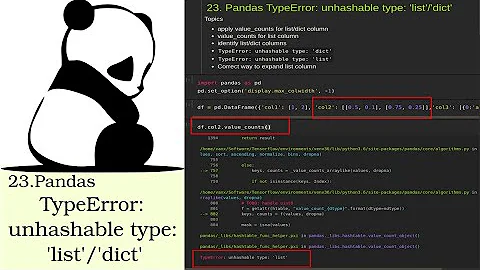How do I fix TypeError: unhashable type: 'list' Error
12,441
Solution 1
Counter needs as its argument an iterable each of whose items is hashable (==can be a key into a dict). The items in you cases are lists, which are not hashable (because they're mutable). Fix: use tuples instead, specifically in your pairs method -- instead of
return filter(re.compile(self.pairwise(self.text)).match, list(self.text))
use
return filter(re.compile(self.pairwise(self.text)).match, tuple(self.text))
Solution 2
TypeError: unhashable type: 'list' Error happens when you try to use a list as key in a dict (or member of set or frozenset). The standard way to solve this issue is to cast a list to tuple, for example:
In [4]: my_dict = {[2,3,4] : 'a'}
---------------------------------------------------------------------------
TypeError Traceback (most recent call last)
<ipython-input-4-cda6d34218c4> in <module>()
----> 1 my_dict = {[2,3,4] : 'a'}
TypeError: unhashable type: 'list'
In [5]: my_dict = {tuple([2,3,4]) : 'a'}
In [6]: my_dict
Out[6]: {(2, 3, 4): 'a'}
Related videos on Youtube
Author by
Toni
Updated on June 27, 2022Comments
-
Toni almost 2 years
I've been searching in other questions, but I found no help. I got this code:
def pairs(self, listOrString): if listOrString: return filter(re.compile(self.pairwise(self.text)).match, frozenset(self.text)) else: return ' '.join(filter(re.compile(self.pairwise(self.text)).match, frozenset(self.text))) def pairs_freqency(self): return Counter(self.pairs(True)) def sum_pairs(self): return len(self.ngrams(self.letters(list),2)) def pair_probability(self): {pair : freqency / self.sum_pairs() for (pair, freqency) in self.pairs_freqency().iteritems()} def pairwise(self, sequence): x,y = tee(sequence) next(y) return zip(x,y)But when I try to print:
print pairs_freqency()I get this error:
**Updated
Traceback (most recent call last): File "...", line 281, in <module> print pairs(string, text) File "...", line 46, in get_pairs return filter(re.compile(self.pairwise(self.text)).match, frozenset(self.text)) File "...", line 190, in compile return _compile(pattern, flags) File "...", line 232, in _compile p = _cache.get(cachekey) TypeError: unhashable type: 'list'Can someone help me as fast as possible.
Thanks. -
Toni over 9 yearsI don't understand that, can u give me an example?
-
 Malik Brahimi over 9 yearsI can't follow your traceback but if you can find the list put
Malik Brahimi over 9 yearsI can't follow your traceback but if you can find the list putfrozenset()around it. -
SethMMorton over 9 yearsIsn't a
tuplea better hashable replacement for alistthan afrozenset? -
 Malik Brahimi over 9 yearsPerhaps, it is simply a preference.
Malik Brahimi over 9 yearsPerhaps, it is simply a preference. -
 Malik Brahimi over 9 years
Malik Brahimi over 9 yearsreturn filter(re.compile(self.pairwise(self.text)).match, frozenset(self.text)) -
Alex Martelli over 9 years@Borgmester I see the error is actually in
re.compile(self.pairwise(self.text))-- it doesn't actually get to the point where my (still-needed) fix will help. So show us whatself.pairwise(self.txt)returns (and the code for thatpairwise), which you have not shown so far (do so editing your Q, it's not readable in comments). -
Alex Martelli over 9 years@Borgmester, if
self.textwas a string, the error fromre.compilewould beTypeError: first argument must be string or compiled pattern. So what isself.textinstead? In any casepairwisereturns azipresult (a list, as it happens, but a tuple would be no better) and that can never be the right type of argument forre.compile. So what is self.text, and what did you thinkre.compileing that zip would do?!






